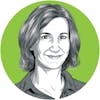 See
more of the story
See
more of the story
By day, Dr. Timothy Roach worked at the hospital, screening patients for signs of the coronavirus.
By night, he was in isolation under his own roof, listening for the sound of his children's voices through the wall.
"It broke your heart a little bit when they'd cry in the middle of the night," said Roach, an internal medicine specialist in the M Health Fairview system whose work with coronavirus patients meant weeks away from his wife and two small sons.
This is the price some of us pay to protect the rest of us.
His baby, Liam, is 2 months old, born into the pandemic.
Big brother, Thomas, 2½, knew his father was in the house, behind closed doors, a smiling face on a screen reading him storybooks.
"He understood that I was doing this to make other people's lives better," Roach said. "I [told him] that other people would do the same."
Some Minnesota doctors and nurses are living out of hotel rooms right now. Nursing home caregivers are sewing their own masks. Grocery store clerks are sanitizing every surface in sight, trying to protect us from the unmasked and the un-handwashed.
The Roach family settled into a routine at the end of every hospital shift. As Roach headed to his home in Blaine, his wife — also a doctor — filled a bucket with warm, soapy water.
Dr. Alesha Roach, an OB-GYN home on maternity leave, left the bucket in the garage and retreated back into the house with the children.
"This sounds horrible," Timothy Roach said of his after-work decontamination routine, "but I strip down to my boxers. I use warm soapy water that my wife puts out before I get home and I'll actually wash down in the garage before I set foot in the house. And then I go directly from the garage to the shower, where I do a more thorough job of getting clean."
Then he headed into the isolated bedroom they'd stocked with a mini-fridge.
The Fairview system, which includes the dedicated COVID-19 care facility at Bethesda Hospital, has admitted at least 300 patients with coronavirus — about a third of all the patients sick enough to require hospitalization in Minnesota. Roach had seen firsthand what the virus can do.
"You really have to be overly protective in these times," he said. "Doing more, rather than less, is going to get the job done … People need to be mindful of where they are and what they're doing and how to reduce risk to themselves and ultimately to others."
Roach worked on the Patient Under Investigation service for a week, trying to identify coronavirus cases. Some patients came in gasping and coughing, some were in gastric distress, some came in with weird rashes. Some had COVID-19. Many did not.
Fourteen days after his last known exposure, he left the bedroom, walked into the kitchen and had a glass of milk waiting when Thomas came down for breakfast.
"I don't think we left each other's side all day," said Roach, now free to play with Thomas in the yard or even treat him to a drive through the carwash.
Minnesotans have applauded front-line workers from their doorways and showered hospitals with baked goods.
If you're looking for more tangible ways to say thank you for the sacrifices of the past weeks and for the sacrifices to come, Fairview is one of many hospital systems asking for donations of N95 masks and isolation gowns. Hospitals are also asking for donations of old iPads to help patients in isolation stay in contact with their loved ones.
Not long after the Roach family reunited, little Thomas started asking his father whether he'd go away again.
"He was very concerned about that," Roach said. "I'm hoping the answer is going to ultimately be no, but it depends on how long COVID sticks around."
jennifer.brooks@startribune.com 612-673-4008 • Follow Jennifer on Twitter: stribrooks





